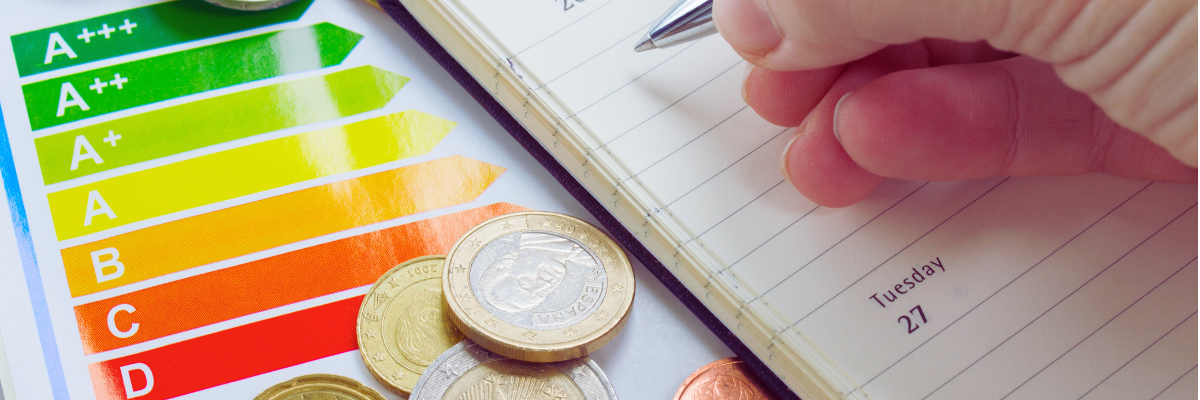
Choosing an efficient heating system is essential for maintaining a comfortable and cosy home during the winter months. However, not all heating systems are equal. Their efficiency can have a significant impact on your energy bill and the environment. In this article, we examine the most efficient and cost-effective heating systems available on the market.
Índice de contenidos
How is energy efficiency calculated?
Before delving into the most efficient heating systems, it’s important to understand how energy efficiency is measured. It’s done using a rating scale from A to G, where A represents the highest efficiency and G the lowest. The calculation is based on the amount of energy used to produce heat compared to the amount of heat emitted into the room.
Advantages and Disadvantages of Different Heating Systems
There are various heating systems available on the market, each with its own pros and cons. Here’s a list of the most common heating systems and their features.
Electric Heating
Electric heating is easy to install and doesn’t require a fuel source, so there’s no need for storage. However, it’s an option that can significantly increase the electricity bill, making it less advisable for large spaces or long periods.
Electric Boiler
Electric boilers work by converting electricity into heat. They are ideal for small homes, providing heat directly to the room. However, they are quite expensive to operate and may not be suitable for larger homes.
Electric Radiators
Electric radiators are a good choice if you want to heat a room quickly as they can warm the air in a short time. However, they tend to be a more expensive option and their energy efficiency can be limited.
Thermal Emitters
Thermal emitters are one of the most efficient options within electric heating systems. They work by converting electricity into heat, which is stored in a ceramic stone. This stone retains heat and releases it slowly, meaning it doesn’t need to be running all the time.
Additionally, some models include programmable thermostats for precise temperature control, further reducing consumption.
Aerothermal Heating
Aerothermal heating is a system that uses renewable energy from the outside air to generate heat in the home. It’s very efficient and can significantly reduce the energy bill in the long term. Some aerothermal systems can also provide air conditioning in the summer.
Electric Stoves
Electric stoves are ideal for small homes or heating a particular room. They are efficient and their installation is not complicated. However, their heating capacity is limited and may not be suitable for large spaces.
Other Heating Systems
In addition to electric heating, there are other heating systems available. Below, we discuss some of the most common ones.
Heat Pump
Heat pumps are a popular choice for those looking for an efficient heating system. They work by extracting heat from the outside air and transferring it inside the house. Heat pumps can generate more than three times the energy they consume. Additionally, some can also provide air conditioning in the summer.
Oil Heating
Oil heating is a popular option in rural areas where gas supply is not available. However, its energy efficiency can be limited, and the fuel makes it more expensive to use.
Gas Heating
Gas heating is a popular choice in urban areas where gas supply is available. It’s very efficient and one of the most economical heating systems.
Pellet Stoves
These stoves use wood pellets as fuel. They are very efficient and can be a very cost-effective option in the long run. Additionally, wood pellets are a renewable energy source, making them a more eco-friendly option than other heating systems.
Biomass Heating
Biomass heating uses renewable fuels like wood and agricultural waste to generate heat in the home. It’s quite efficient and can significantly reduce the energy bill in the long term. However, it’s not widespread in our country and can be complex to install.
Heating Diffusion Systems. Do They Improve Efficiency?
Heating diffusion systems, such as air ducts or water radiators, significantly improve the efficiency of heating in a home. Air duct systems distribute heat evenly throughout the house, while water radiator systems take advantage of the residual heat from a boiler or heat pump.
So, what is the most efficient and economical heating system?
The answer depends on several factors, such as the size of the home, geographical location, and individual heating needs. In general, the most efficient heating systems are those that use renewable energy sources, such as aerothermal, biomass heating, and pellet stoves.
However, these systems have a higher initial investment and require careful planning to maximize their energy efficiency. Therefore, it’s necessary to analyze the situation and the variables to choose the best option based on individual needs.
How to Increase the Efficiency of Our Heating System
Regardless of the heating system you choose, there are several measures you can take to increase the efficiency of your heating system. These measures include:
- Ensuring your home is well-insulated and sealed to prevent heat loss.
- Keeping your heating system clean and in good working order.
- Using programmable thermostats to control temperature and reduce energy consumption.
- Using curtains and blinds to block out the cold in winter and heat in summer.
In conclusion, if you’re looking for an efficient heating system, you need to analyze all the options on the market. Considering not only the initial investment but also the subsequent operating and maintenance costs.
As we’ve seen, there are various heating systems available, and each has its advantages and disadvantages. We hope this information has helped you understand the available options and choose the best for your situation.